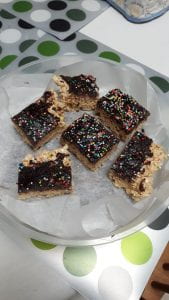After our group’s extensive planning with the assistance of our supervisors and Ms. Toth, we got on the plane to Cambodia on the 25th of May. I find that our preparations before we left really began to pay off when we finally landed, as we felt safer and more comfortable knowing measures had been taken to ensure we got back to Singapore in one piece. On the first day after coming back from Phnom Penh International Airport, we made ourselves comfortable in our hotel and then took a walk around our area to see meal options and various supermarkets in case we needed anything. I feel that this first day simply getting to know our surrounding area was a good opportunity for our group to get to know each other and our travel habits in more depth, as we had never spent so much time together. After this, we went to bed pretty early on so that we would be ready for our first day at Free the Bears the following morning.
The first day at Free the Bears sanctuary gave us an opportunity to do a bit of ‘tourism’, in that we not only got to see the moon and sun bears we would be working with but all the other animals the sanctuary lent home to. We also met Pesei, the organization representative we had been in contact with prior to arriving at Cambodia. She was extremely welcoming and helpful, giving us detailed information about each of the animals and the sanctuary itself. We also got a glimpse of what we would be doing in terms of service during the course of the next 3 days when we prepared the enrichment foods and then distributed them where the bears would later find and hopefully enjoy. After experiencing this first day, we felt pretty comfortable with the sanctuary and the bears but didn’t really expect the degree of physical work that we would later endure. Over the course of the next days, we cleaned up the sanctuary and prepared enrichments in the morning, followed by a short lunch break, then more food weighing and distribution. Though these seem like relatively simple tasks, all of these combined with the heat and our inexperience with many of the activities we were expected to perform, we returned home each day feeling totally drained and exhausted. We began to feel like going to the service didn’t really hold a lot of meaning to us anymore, as the tasks seemed repetitive, as we couldn’t really interact with any of the animals as much as we’d hoped to. When we realized that this feeling of demotivation was mutual, we began to reevaluate our purpose in going to Free the Bears for our project week, and what we wanted to be able to do further. It gave us an opportunity to come back together as a group and think of ways we could overcome our problems.
By acknowledging each of our troubles and our mutual demotivation, we came up with an action plan; a list of things we wanted the service partners to know about us so that we could be more effective when helping with the keepers’ work, and how we would overcome situations where we genuinely felt uncomfortable performing a certain task. By doing this, we worked on LO 2: Demonstrate that challenges have been undertaken, developing new skills in the process. I am really proud of how our group really put our full effort and energy into each task to avoid disappointment from our service partners. We really wanted to demonstrate that we were capable of performing our given tasks, and did not want to let them down in any aspect. Consequently, we may have pushed ourselves too far, to the point of being too exhausted to even walk out of our hotel room to have dinner. Once we realized this was not what we wanted our project week to be remembered as, we began to come up with ways to problem solve, developing new skills in the process of doing so. Although we always knew about the importance of communication between two parties, I think our position as helpers to the bear keepers made it hard for us to speak up or let them know we weren’t comfortable, in an attempt to portray ourselves in the best light. But in the end, we learned that staying quiet and ultimately burning ourselves out wouldn’t be beneficial for both us and our service partners, as we would not be able to complete tasks in the most effective way. I think this ‘problem’ actually made our project week more meaningful than perhaps one where we felt completely comfortable and relaxed. It helped us think on our feet, and problem solve in a realistic situation. We learned so much from this trip whether intentional or not, and we all agree that we would love to do it again given the chance.









